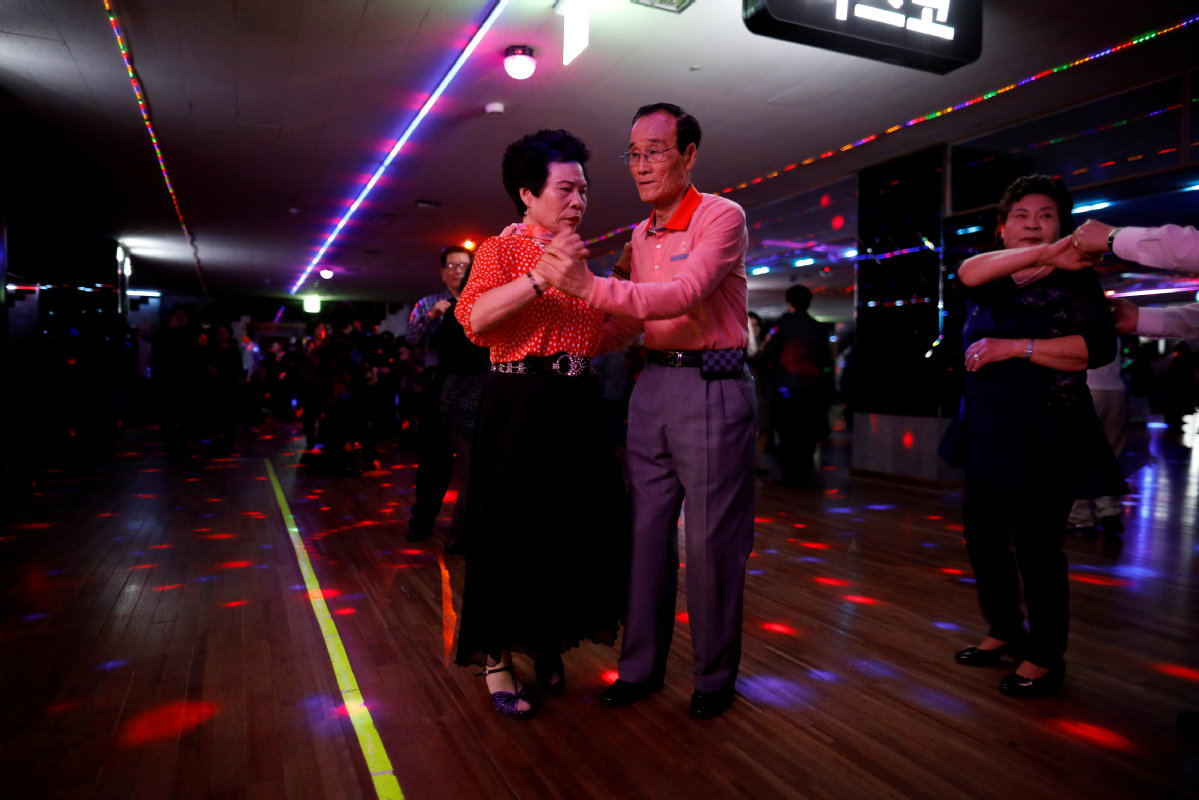S. Korea's elderly find escape from anxiety in daytime discos
China Daily | Updated: 2018-04-17 09:03

SEOUL - A discotheque hidden among the back alleys of eastern Seoul is packed with hundreds of grey-haired couples on a Monday afternoon, dancing to local hits from the 1960s in a basketball court-sized hall.
Kim Sa-gyu, 85, calls it his "playground".
"What else would I do all day? My family is busy with work. I hate going to senior centers cause all they do there is smoking," said Kim, wearing a beret as he sat on a bench at the edge of a dance floor decorated with fairy lights and mirror balls.
Seven days a week, he gets up at 5 am, has breakfast with his son and two grandchildren, gets an hour of massage therapy to relieve knee pain, then hops on a bus. His destination is the daytime disco for the elderly in New Hyundai Core.
Kim, who has been jobless since retiring as a hospital administer 20 years ago, is among about 1,000 customers each weekday at the disco, called a colatec. It is one of nearly 1,000 such facilities around the country.
Almost 2,000 people visit on a weekend day, said owner Choi Jung-eun.
Colatecs, a portmanteau of cola and discotheque, have arisen to serve South Korea's rapidly aging population, as a growing number of lonely, impoverished and ailing people rediscover ways to entertain themselves after decades of hard work.
Some are here because they simply don't feel welcome at home.
"My wife yaps at me for breathing if I stay home. I love this music and no one minds me here," a grey-haired man who identified himself only as 'white boots' said, after paying an entrance fee of 1,000 won (90 cents) - a fraction of what clubs in Seoul's affluent Gangnam charge their youthful clientele.
The generation that helped rebuild Asia's fourth-largest economy after the 1950-53 Korean War is now the poorest and most depressed among member countries of the Organization for Economic Cooperation and Development.
The relative poverty rate of South Korea's elderly stood at 49.6 percent in 2013, four times the OECD average, according to the latest available data. The elderly suicide rate rose from 35 per 100,000 persons in 2000 to 82 in 2010, also far above the OECD average of 22.
South Korea is aging faster than any other developed country, yet there are few post-retirement jobs, or even cheap leisure, available for the elderly.
At the New Hyundai Core colatec, a dance instructor walked around the hall searching for dancers who looked lost or lonely. Three full-time matchmakers helped dancers who were too shy to find a partner.
But Song-ah, a dance instructor, said she is always on the lookout for dating-related fraud at colatecs.
"Sometimes I see young cougars in their 50s asking really old grandpas out for a dance. I report them to the owner and separate them," she said, adding that lonely seniors can be taken advantage of by strangers.
But for the most part, colatecs do more good than harm, said Joo Won, an economist at the Hyundai Research Institute.
"We have one unhappy aging society that needs support both from the public and the government. Places like colatecs need to be nurtured," Joo said.
Reuters
























